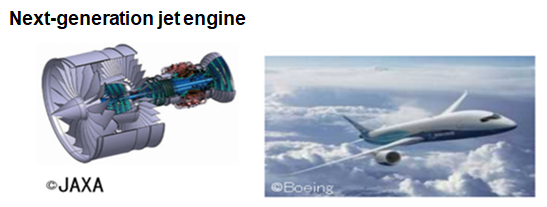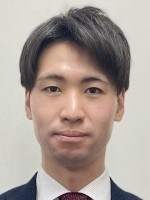Development of Materials for Aircraft Engines and Bases for Material Evaluation Systems
Project overview
In this project, NEDO will work to improve the efficiency and sophistication of manufacturing processes essential for the mass production of aircraft engine parts in order to meet the demand for improved fuel efficiency and environmental compatibility of aircraft. Additionally, NEDO will utilize information science, such as materials informatics, to develop a data-driven alloy search system required for high-performance materials for aircraft engines. Furthermore, in order to strengthen the competitiveness of domestically produced materials, NEDO will collaborate with related companies and research institutes to build a database necessary for the accumulation of material data, strength evaluation, and performance evaluation related to aircraft engines.
Accordingly, NEDO aims to develop new alloys for aircraft engines and build a database that can withstand certification, which is essential for cooperation with overseas OEMs, to apply to future aircraft engines, and to strengthen the international competitiveness of the Japanese aircraft engine industry.
-
 Schematic diagram of next-generation jet engine and photograph of aircraft
Schematic diagram of next-generation jet engine and photograph of aircraft
Research and Development
R&D Item [1] "Development of Innovative Engine Parts Manufacturing Process"
In this R&D project, NEDO will particularly focus on the forging process and aim to improve the efficiency and sophistication of the manufacturing process. Specifically, with conventional forging presses, the mold material is easily oxidized at high temperatures, so it was necessary to draw a vacuum during processing. However, the forging process can be made more efficient by applying a die material that does not oxidize as easily as when processed as in the air. In addition, the development of mold-heating equipment that can accommodate multiple types of production enables a reduction in capital investment.
R&D Item [2] "Development of Innovative Alloy Search Method"
Materials for aircraft engines must be able to withstand the harsh environment of high temperature and high pressure. By appropriately combining multiple metal elements, NEDO can develop "completely new alloys" that are lighter than conventional products and have superior heat resistance, wear resistance, thermal conductivity, and electrical conductivity.
Alloy properties are determined by combinations of metal elements and process conditions, but due to the vast number of combinations, conventional experimental methods require astronomical amounts of time. Hence, NEDO will explore the possibility of applying this method to aircraft engines by developing an innovative, data-driven alloy search method that collects a large amount of high-quality data required for alloy search at high speed and uses materials informatics to significantly reduce the time required to find an alloy with desired properties.
R&D Item [3] "Establishment of Infrastructure for Aircraft Engine Evaluation System"
Due to the high level of safety and reliability required for the final product, strict certification standards are required for aero engines starting from the material stage. NEDO will collaborate with companies and research institutes to improve the competitiveness of domestically produced materials ,efficiently obtain materials data, and maintain a practical database that includes the impact of defects during manufacturing. NEDO also manufactures actual components based on the database NEDO has built and conduct performance evaluation tests.
Project Manager

In this project, NEDO will improve Japan's competitiveness in the manufacture of materials and components for aircraft engines by streamlining the component manufacturing process, developing domestically produced materials using computer science, and building a database of materials for aircraft engines to be certified by aviation authorities. NEDO will further strengthen our efforts to improve our international competitiveness through an integrated implementation system from basic development to applied development and mass production technology development, which was realized in FY2022. Carbon neutrality by 2050 has been advocated, and there is a strong need to reduce CO2 emissions. NEDO aims to contribute to the reduction of CO2 emissions when the new alloys with excellent heat resistance NEDO is developing in this project are implemented as aircraft engine components.
Basic information
| Technical field |
|
|---|---|
| Project code | P21007 |
| Department in charge |
|
Last Updated : May 12, 2025
